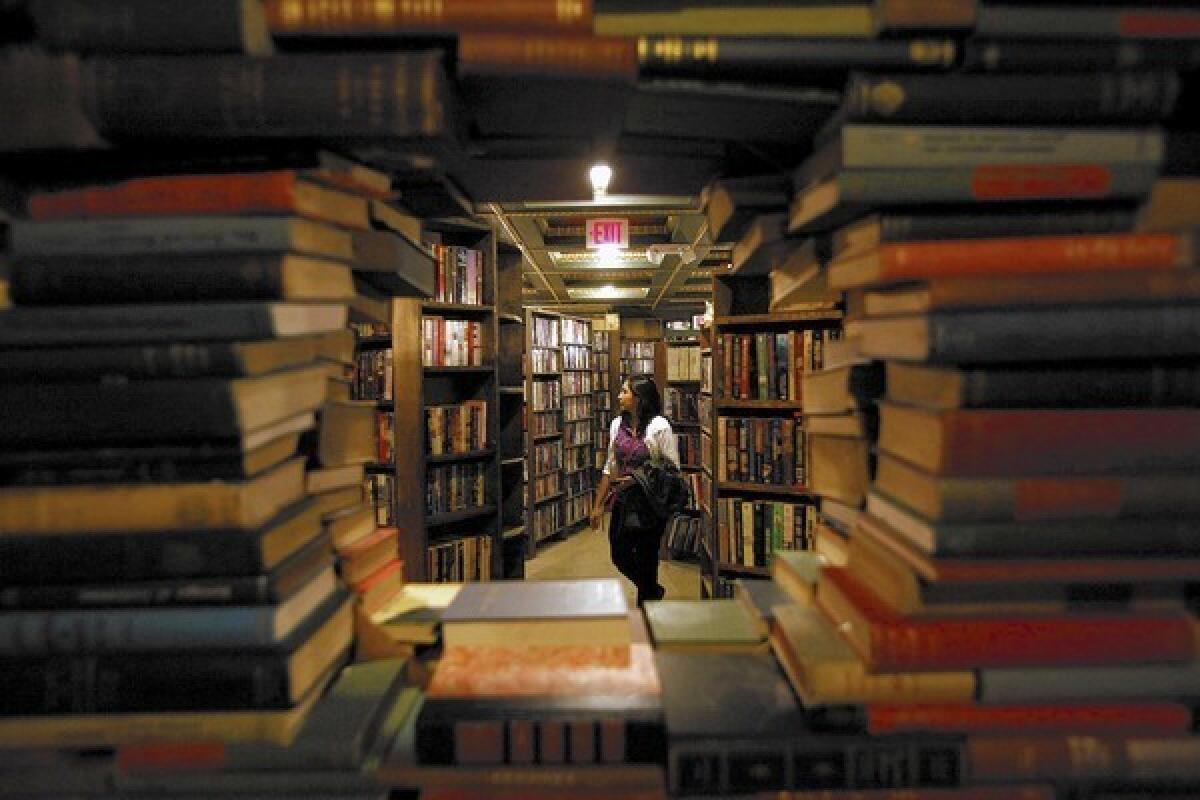If marijuana is essential during the coronavirus shutdown, why not books?

- Share via
Why should it be easier to buy marijuana than a good book at a store in Los Angeles during the coronavirus shutdown?
Mayor Eric Garcetti and Gov. Gavin Newsom’s stay-at-home edicts let dispensaries stay open but force bookshops to shutter indefinitely. Chevalier’s in Larchmont will take phone orders. Skylight Books in Los Feliz, Book Soup in West Hollywood and Vroman’s in Pasadena are “closed temporarily” but forwarding online orders to Ingram, a wholesaler that will ship direct to buyers. The Last Bookstore, downtown, is seeing customers by appointment.
Powell’s Books, one of the nation’s largest independent bookstores, with five Oregon locations, laid off more than 300 staff members, although many were rehired as a surge of online orders came in. This legendary institution is still shipping books from its warehouse, but you can’t go in and browse, even in small numbers, separated by plenty of open space.
And it could get worse. “These are unprecedented and grievous times,” Emily Powell wrote in her initial letter to employees, calling the path ahead “dark and scary.” When she announced that as of Saturday, she’d been able to rehire 100 staffers, she was grateful to her customers but only marginally more optimistic: “We don’t know what the future holds — none of us does. We’re going to keep the doors of Powells.com open as long as we can....”
Diesel in Brentwood has opted for an ad hoc form of curbside pickup, leaving books in bags with customers’ names on them on a table just inside the store’s door for a few hours each day. Though they’re still recommending books by phone, Diesel’s employees are uncertain about the future. “We consider ourselves essential, like newspapers, media, magazines. That is our mindset,” said bookseller Lynn Aime.
Aime is right. Books are essential goods and that ought to mean bookstores are exempt from shutting down during the coronavirus pandemic. As are bread and milk, gas and aspirin, alcohol and marijuana, books should be available, with safety precautions in place, at the usual places we buy them in our neighborhoods.
States are largely left to make their own decisions about public health shutdowns. Newsom could put California in the vanguard by expressly adding bookstores to the list of essential businesses. Surely with people maintaining six feet of social distance, hand sanitizer everywhere, a strict limit on the number of customers let inside and the by-appointment option — in-person book buying can be made at least as safe as shopping for dry pasta.
In the meantime, some bookstore owners are trying to pay their staffs even while books aren’t going out at the usual rate and most of their employees are staying home. As Linda McLoughlin Figel of Pages in Manhattan Beach put it, dryly: “It’s a bit tricky.” Bookstores will get some sort of help from the emergency stimulus bill Congress has teed up, but bricks-and-mortar bookshops are already fragile enterprises, so who knows how many will survive the shutdown?
We readers can help. Until bookshops fully reopen, we can use our discretionary income to order books directly from independent booksellers. We can buy gift cards to help the bottom line too. While it’s true we can also get deliveries from the likes of behemoth Amazon, or download ebooks and audiobooks, those shopping choices are already part of independent bookstores’ economic woes. Besides, there are many customers with lower incomes who don’t have access to iPads or Kindles. With libraries also out of the picture, these readers are left without words.
Finally, we can also let our city, county and state leaders know how much we need bookshops and their staffs as the shutdown goes on, and once it’s over.
Books provide spiritual nourishment, education, enlightenment, role models, diversion. As Lori Gottlieb, therapist and author puts it, “One way to feel understood and part of something bigger, less alone, is to immerse ourselves in stories. They help us see ourselves.”
Journalist and novelist Michael Scott Moore, who was held hostage in Somalia for more than two years, had scraps of newspapers but no books when he was trapped with nowhere to go. As Moore says, “I don’t wish a coronavirus lockdown on anyone without books.”
The health of a nation’s literature depends on its availability to the people, and “if a nation’s literature declines,” wrote Ezra Pound, “the nation atrophies and decays.” Bookstores are essential because books are essential.
Wendy Paris is the author of “Splitopia: Dispatches from Today’s Good Divorce and How to Part Well.”
More to Read
A cure for the common opinion
Get thought-provoking perspectives with our weekly newsletter.
You may occasionally receive promotional content from the Los Angeles Times.








